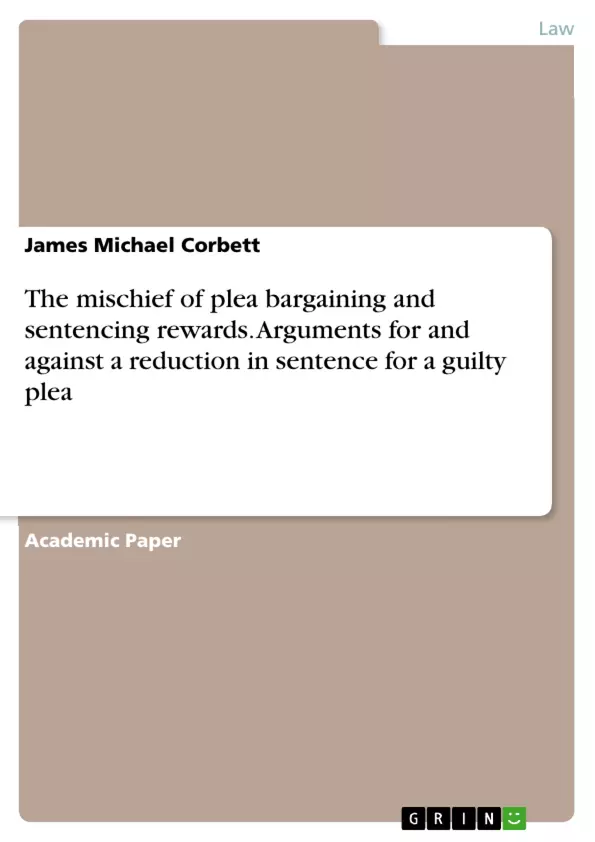This essay will begin by critically examining the arguments both for and against the discount. In first considering the arguments in favour of the reduction it shall clearly set out the reasons in support of this and shall include an examination into the commentary from a range of different theorists, some of which are against the reduction and who criticise these arguments in favour. This critic will acknowledge these viewpoints and shall respond with reasoning to suggest that the arguments against the discount cannot stand. Thereafter it shall go on to evaluate the arguments not in favour of the discount and this will include a counter response, first in acknowledging the points raised, before then going on to examine what aspect of these arguments are taken issue with.
After critically examining and evaluating the arguments for and against the discount the essay shall then go on to consider the potential solutions to dealing with a number of concerns the reduction presents and whether they are likely to work. The evaluation of these solutions shall then go on to consider the recommendation and will involve a presentation of discussion around the reforms that are intended to rectify the concerns.
In English law a sentencing discount is awarded to the accused if they plead guilty to the crime they are charged with. The current award of around one third distinguishes those who admit to being in the wrong from those who continually deny their flaws.
Inhaltsverzeichnis (Table of Contents)
- Introduction
- The arguments in favour of the sentencing discount
- The Remorse Argument
- The sparing the victim argument
- The arguments against the sentencing discount
- Sentence discounting encourages the innocent to plead guilty
- Sentence discounts penalise those who exercise the right to take their case to trial
Zielsetzung und Themenschwerpunkte (Objectives and Key Themes)
This essay explores the arguments for and against the practice of awarding a sentencing discount to defendants who plead guilty in English law. The essay critically examines both sides of the debate, considering a range of theoretical perspectives and case law.
- The impact of the sentencing discount on innocent defendants
- The fairness of penalizing those who choose to exercise their right to trial
- The effectiveness of the remorse argument in justifying the discount
- The role of efficiency and resource savings in the sentencing process
- The implications of the sentencing discount for victims and witnesses
Zusammenfassung der Kapitel (Chapter Summaries)
The essay begins by examining the arguments in favor of the sentencing discount, focusing on the remorse and sparing-the-victim justifications. It critically analyzes these arguments, considering counter-arguments and exploring the nuances of these justifications. The essay then delves into the arguments against the discount, specifically addressing concerns about encouraging innocent defendants to plead guilty and the potential for penalizing those who exercise their right to trial. It examines these arguments in detail, drawing on case law and theoretical perspectives to present a balanced discussion of the issues.
Schlüsselwörter (Keywords)
The key terms and concepts explored in this essay include sentencing discount, plea bargaining, remorse, victim sparing, innocent defendants, right to trial, efficiency benefits, criminal justice system, and English law.
Frequently Asked Questions
What is a sentencing discount in English law?
A sentencing discount is a reduction in the severity of a sentence (often by up to one third) awarded to a defendant who pleads guilty to the charges against them.
What are the main arguments in favor of sentencing rewards?
Proponents argue it demonstrates remorse, spares victims and witnesses the trauma of a trial, and increases the efficiency of the criminal justice system by saving resources.
Does sentence discounting encourage innocent people to plead guilty?
This is a major criticism. Critics argue that the fear of a much harsher sentence after a trial may pressure innocent defendants into accepting a "deal" to minimize their risk.
Does the sentencing discount penalize the right to a trial?
Critics suggest that if those who plead guilty get a "discount," then those who exercise their fundamental right to a trial are effectively being "taxed" or penalized with a longer sentence.
How does the "remorse argument" work?
The argument assumes that an early guilty plea is a genuine sign of taking responsibility and feeling regret, which justifies a more lenient approach to rehabilitation and punishment.
- Citation du texte
- James Michael Corbett (Auteur), 2012, The mischief of plea bargaining and sentencing rewards. Arguments for and against a reduction in sentence for a guilty plea, Munich, GRIN Verlag, https://www.grin.com/document/949839



